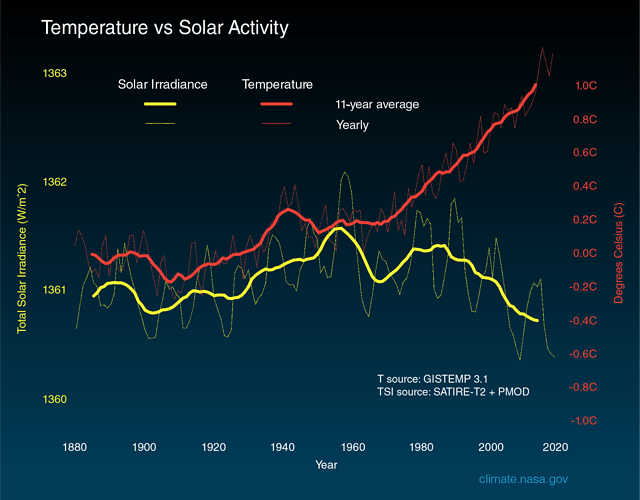There’s actually nothing in the author’s comments, or the linked articles, to explain how anyone can say that the sun’s activity must increase in order to add warming to the planet. There is a colourful graphic emphasizing the fact that the solar cycles since # 19 (circ 1958) are lower. However, as I’ve illustrated with the warming of a pot of water analogy, even when you start with high heat and reduce that heat, there is still added warming, so long as that heat is more than the system can absorb. This is very simple, demonstrable and true. I have yet to find any explanation for how/why this concept would not apply in understanding the heat from the sun.
Here’s a little deeper dive into the solar activity data - the 4 solar cycles, dating roughly 1910-1950, are credited with a strong warming at the same time. The 4 solar cycles at the end of the century, dating roughly 1965-2005, even though all slightly lower than the extra strong solar cycle peak in 1958, have essentially the same total energy input as the earlier warming period. So, why is the same amount heat responsible for strong warming at one time and have no impact (some even claim that there should have been cooling) in another time? There is no explanation or evidence, that I’ve been able to find, to make such a determination.
In most scientific endeavours there would be an effort to design an experiment to differentiate the effects of different drivers. In this case, I think we are all looking for more clear evidence of the effect of solar activity (and possible related natural amplifiers) versus CO2 level. If I was designing such an experiment, I would conduct a number of tests - increase CO2 while solar heat is kept low; increase CO2 while solar heat is increased; increase CO2 while solar heat is kept high; hold CO2 steady while solar heat is kept low; hold CO2 steady while solar heat is increased; hold CO2 steady while solar heat is kept high. Unfortunately, bench scale tests with CO2 and some artificial heat source, run the risk of missing possible natural amplifiers. So, I understand why not much is done in the lab. And in real-life, it is virtually impossible to influence these factors in a controlled manner, which leaves us watching the evidence of the natural progression, hoping to see something of significance.
Low, and behold, we have a ready made, natural experiment unfolding all around us. Whereas CO2 has been steadily increasing since mid-20th century, even slightly accelerating, and continuing to increase today, solar energy had a period of 7 consecutive above average cycles over roughly the same period, which for my thinking makes it difficult to say which one had how much effect on the warming at that time. What would be great is to have a significantly different set of CO2 and solar energy inputs and see what happens to global temp. And, voila, we are now forecasting having two back-to-back, below-average solar cycles for the first time in more than 180 years. The first of these cycles had a peak around 2014, with the second expected around 2025. These will still only be just a little below medium heat, and not all the way to historical low, so likely no snap ice-age, but should be different enough from the previous 50-60 years to provide some really worthwhile data / evidence of the true impact of solar activity and any related amplifiers.
I’d be happy to watch this with you and others over the coming years and have a proper scientific observation, discussion and interpretation discourse. Maybe we can help lead some important perspective on the climate issue. None of us wants to ignore a potential serious problem, yet I’m not comfortable with the level of fear around something that has so little solid evidence.
Maybe that’s another faith element for me. I’ve come to understand, at least a little bit, that fear is something that we are not meant to live with. It seems to me that most of what we read about climate change is how bad it could be if the worst was to happen and that worst is based on solar activity having negligible impact on global temp. If we could get better definition of the relative impacts of solar, related natural factors, and CO2, then we might be able to take a bunch of the fear out our day-to-day living and allow us to focus more on feeding the hungry, etc.
